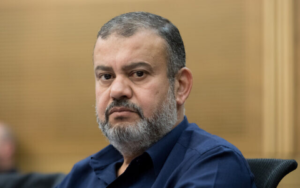Arabic is the legacy of many Jews. Why fear it in the Knesset?

MK Walid Taha in the Knesset, 19 November 2019
Uzi Baram writes in Haaretz on 12 January 2022:
Mansour Abbas and Walid Taha evoked the wrath of right-wing lawmakers when they dared speak to each other in Arabic at the Knesset, addressing their public in its language to explain an electricity bill that enables Arab homes built without permits to connect to electricity grids.
The fury was staged to some extent since MK David Amsalem is aware, as are his colleagues, that incitement against Arabs tends to garner sympathy and votes.
But beyond the show, the expressions uttered by Amsalem revealed real emotions: “Two Arabs are talking among themselves and making fun of us,” he said. “Shall I get you some baklava pastry?” he asked them. So much racism and incitement, all authentic, are expressed in his words.
It would have sufficed if this government had been established only for the sake of legislating this law. The deliberate and humiliating neglect of so many citizens living without electricity was justified in the past on the basis of legal arguments.
No one bothered to sort out this mess until United Arab List MK Abbas appeared on the scene. The so-called “electricity law” makes this government more “real,” in the sense that it’s doing something tangible to benefit the weakest segments of society. The UAL imposed the bill on this peculiar government, but the coercion is as justified as could be.
No decent person could avoid being sympathetic to the vast majority of Israel’s Arabs who are trying, despite an uncaring establishment and racist and humiliating attitudes, to be valuable citizens in Israeli society.
Having ties to Arabic and Arab culture is part of the legacy of many Jewish families, including that of my mother, who was part of the Mughrabi [North African] Elqayam family. Family member Musa Elqayam lived with his family in Gaza until the riots of 1929 broke out.
He was a classic storyteller and used to tell me about the horseback riding competitions he and his friends held with Arab riders. His Arab rivals, he related, were shocked when he added Tziporah Zaid, one of the founders of the Hashomer defense organization, to his team. Musa always regretted that he couldn’t tell his story in the rich and flowery Arabic he loved, and I regret that I don’t speak Arabic.
Musa’s academic follower was his nephew, my cousin Avi Elqayam, who heads the Department of Jewish philosophy at Bar-Ilan University. My father speaks, reads and writes Arabic fluently. He is an expert on Sufism, a mystical branch of Islam, and Kabbala. Musa, who passed away, and his nephew, neither of them outspoken leftists, were cultured men, feeling at home in both Hebrew and Arabic.
But one can’t do without politics since instead of rejoicing at the connection to Arabic and Arab culture, many politicians prefer to build themselves up on discrimination and racism. So the battle against their prejudice must take place in the political arena.
Racism is what pushed me into a defiant stance. In my last term in the Knesset, I relentlessly brought to the agenda proposals relating to the condition of Israel’s Arab citizens, all the while maintaining a dialogue with lawmakers Mohammad Baraka and Issam Makhoul. In my private life, in which soccer holds a place of honor, I’ve found myself rooting for the Bnei Sakhnin team – my wish to see Israel’s national soccer team’s Moanes Dabour succeed stems from the incitement of several soccer fans against him.
This article is reproduced in its entirety
